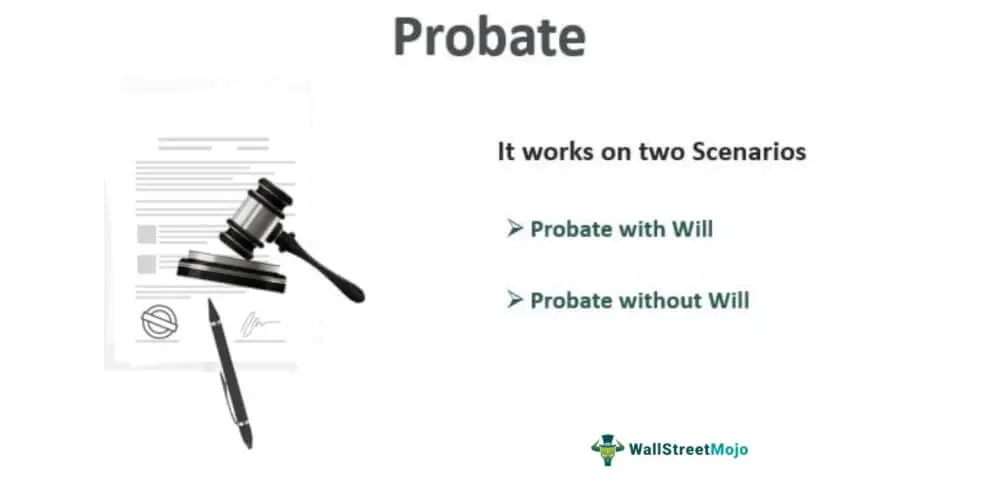What is Probate and How Does it Work?

Probate is the legal process that takes place after a person passes away. It involves proving the validity of the deceased person’s will, or if there is no will, determining how their assets will be distributed. The probate process ensures that the deceased person’s debts are paid and that their assets are transferred to the appropriate beneficiaries.
How does probate work?

The probate process typically begins with the filing of a petition in the appropriate court. This petition requests the court to appoint an executor or personal representative to oversee the administration of the estate. The court will then issue letters testamentary or letters of administration, which give the executor or personal representative the legal authority to act on behalf of the estate.
Once appointed, the executor or personal representative is responsible for gathering the deceased person’s assets, paying any outstanding debts or taxes, and distributing the remaining assets to the beneficiaries. This process may involve valuing the assets, selling property if necessary, and resolving any disputes that may arise.
What are the steps in the probate process?
The probate process typically involves the following steps:
- Filing the petition: The first step is to file a petition with the court to open the probate case. This is usually done by the executor or personal representative named in the will.
- Notifying interested parties: Once the petition is filed, the court will require that interested parties, such as heirs and creditors, be notified of the probate proceedings.
- Gathering assets: The executor or personal representative is responsible for locating and gathering all of the deceased person’s assets. This may include bank accounts, real estate, investments, and personal belongings.
- Paying debts and taxes: Before any assets can be distributed to the beneficiaries, the executor or personal representative must pay any outstanding debts or taxes owed by the estate.
- Distributing assets: Once all debts and taxes have been paid, the executor or personal representative can distribute the remaining assets to the beneficiaries according to the terms of the will or the laws of intestacy.
- Closing the estate: After all assets have been distributed, the executor or personal representative can petition the court to close the probate case. This involves providing an accounting of all transactions and obtaining the court’s approval.
It is important to note that the probate process can be time-consuming and costly. It can also be emotionally draining for the family members involved. Therefore, it is often recommended to engage in estate planning and create a will to avoid the probate process altogether or minimize its impact.
Differences Between With and Without a Will
One of the main differences between probate with a will and probate without a will is the level of control the deceased person has over the distribution of their assets. With a will, the deceased person can specify who will receive their property, how much they will receive, and any conditions or restrictions that should be placed on the distribution.
On the other hand, without a will, the state’s intestacy laws dictate how the assets will be distributed. This means that the deceased person has no control over who will receive their property and how much they will receive. The distribution is typically based on the legal relationship of the potential heirs, such as spouses, children, parents, and siblings.
Another important difference is the time and cost involved in the probate process. With a will, the probate process is usually smoother and faster because the deceased person’s wishes are clearly stated. The executor named in the will can easily carry out the distribution of assets according to the instructions provided.
Without a will, the probate process can be more complex and time-consuming. The court will appoint an administrator to handle the distribution of assets, and this person may not be someone the deceased person would have chosen. The administrator will need to follow the state’s intestacy laws, which can lead to disputes among potential heirs and delays in the process.
It is also worth noting that having a will can help minimize estate taxes and protect the assets from creditors. With a will, the deceased person can employ various estate planning strategies to reduce the tax burden on their estate and ensure that their assets are passed on to their intended beneficiaries.
Importance of Having a Will

Having a will is an essential part of estate planning and can provide peace of mind for both you and your loved ones. A will is a legal document that outlines your wishes for the distribution of your assets after your death. It allows you to specify who will inherit your property, money, and other belongings, as well as who will be responsible for carrying out your final wishes.
One of the main reasons why having a will is important is that it allows you to have control over what happens to your assets. Without a will, your estate will be subject to the laws of intestacy, which means that the court will determine how your assets are distributed. This can lead to disputes among family members and may result in your assets being distributed in a way that you would not have wanted.
Having a will also allows you to choose an executor, who will be responsible for managing your estate and ensuring that your wishes are carried out. This can be a trusted family member, friend, or even a professional executor. By choosing an executor, you can have peace of mind knowing that someone you trust will handle your affairs after your death.
In addition to asset distribution and choosing an executor, a will can also be used to name guardians for your minor children. This is especially important if you are a single parent or if both parents pass away simultaneously. By naming a guardian in your will, you can ensure that your children will be taken care of by someone you trust.
Furthermore, having a will can help to minimize the potential for family disputes and legal battles. By clearly outlining your wishes in a legally binding document, you can reduce the likelihood of disagreements among family members and ensure that your estate is distributed according to your wishes.
Overall, having a will is crucial for anyone who wants to have control over the distribution of their assets and ensure that their final wishes are carried out. It provides peace of mind for both you and your loved ones and can help to minimize the potential for family disputes. Consulting with an estate planning attorney can help you create a comprehensive will that meets your specific needs and ensures that your wishes are legally protected.

Emily Bibb simplifies finance through bestselling books and articles, bridging complex concepts for everyday understanding. Engaging audiences via social media, she shares insights for financial success. Active in seminars and philanthropy, Bibb aims to create a more financially informed society, driven by her passion for empowering others.
